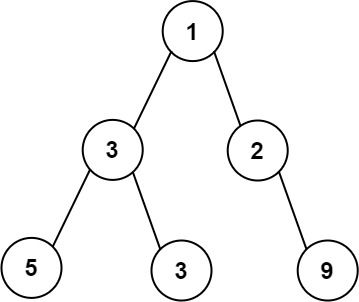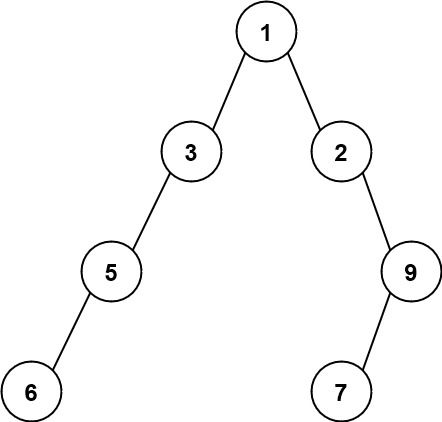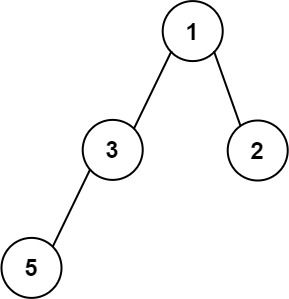Welcome to Subscribe On Youtube
662. Maximum Width of Binary Tree
Description
Given the root of a binary tree, return the maximum width of the given tree.
The maximum width of a tree is the maximum width among all levels.
The width of one level is defined as the length between the end-nodes (the leftmost and rightmost non-null nodes), where the null nodes between the end-nodes that would be present in a complete binary tree extending down to that level are also counted into the length calculation.
It is guaranteed that the answer will in the range of a 32-bit signed integer.
Example 1:

Input: root = [1,3,2,5,3,null,9] Output: 4 Explanation: The maximum width exists in the third level with length 4 (5,3,null,9).
Example 2:

Input: root = [1,3,2,5,null,null,9,6,null,7] Output: 7 Explanation: The maximum width exists in the fourth level with length 7 (6,null,null,null,null,null,7).
Example 3:

Input: root = [1,3,2,5] Output: 2 Explanation: The maximum width exists in the second level with length 2 (3,2).
Constraints:
- The number of nodes in the tree is in the range
[1, 3000]. -100 <= Node.val <= 100
Solutions
BFS or DFS.
-
/** * Definition for a binary tree node. * public class TreeNode { * int val; * TreeNode left; * TreeNode right; * TreeNode() {} * TreeNode(int val) { this.val = val; } * TreeNode(int val, TreeNode left, TreeNode right) { * this.val = val; * this.left = left; * this.right = right; * } * } */ class Solution { public int widthOfBinaryTree(TreeNode root) { Deque<Pair<TreeNode, Integer>> q = new ArrayDeque<>(); q.offer(new Pair<>(root, 1)); int ans = 0; while (!q.isEmpty()) { ans = Math.max(ans, q.peekLast().getValue() - q.peekFirst().getValue() + 1); for (int n = q.size(); n > 0; --n) { var p = q.pollFirst(); root = p.getKey(); int i = p.getValue(); if (root.left != null) { q.offer(new Pair<>(root.left, i << 1)); } if (root.right != null) { q.offer(new Pair<>(root.right, i << 1 | 1)); } } } return ans; } } -
/** * Definition for a binary tree node. * struct TreeNode { * int val; * TreeNode *left; * TreeNode *right; * TreeNode() : val(0), left(nullptr), right(nullptr) {} * TreeNode(int x) : val(x), left(nullptr), right(nullptr) {} * TreeNode(int x, TreeNode *left, TreeNode *right) : val(x), left(left), right(right) {} * }; */ class Solution { public: int widthOfBinaryTree(TreeNode* root) { queue<pair<TreeNode*, int>> q; q.push({root, 1}); int ans = 0; while (!q.empty()) { ans = max(ans, q.back().second - q.front().second + 1); int i = q.front().second; for (int n = q.size(); n; --n) { auto p = q.front(); q.pop(); root = p.first; int j = p.second; if (root->left) q.push({root->left, (j << 1) - (i << 1)}); if (root->right) q.push({root->right, (j << 1 | 1) - (i << 1)}); } } return ans; } }; -
# Definition for a binary tree node. # class TreeNode: # def __init__(self, val=0, left=None, right=None): # self.val = val # self.left = left # self.right = right class Solution: def widthOfBinaryTree(self, root: Optional[TreeNode]) -> int: ans = 0 q = deque([(root, 1)]) while q: ans = max(ans, q[-1][1] - q[0][1] + 1) for _ in range(len(q)): root, i = q.popleft() if root.left: q.append((root.left, i << 1)) if root.right: q.append((root.right, i << 1 | 1)) return ans -
/** * Definition for a binary tree node. * type TreeNode struct { * Val int * Left *TreeNode * Right *TreeNode * } */ func widthOfBinaryTree(root *TreeNode) int { q := []pair{ {root, 1} } ans := 0 for len(q) > 0 { ans = max(ans, q[len(q)-1].i-q[0].i+1) for n := len(q); n > 0; n-- { p := q[0] q = q[1:] root = p.node if root.Left != nil { q = append(q, pair{root.Left, p.i << 1}) } if root.Right != nil { q = append(q, pair{root.Right, p.i<<1 | 1}) } } } return ans } type pair struct { node *TreeNode i int }